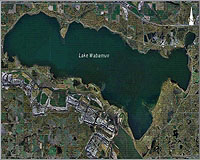| . |  |
. |
New Haven CT (SPX) May 28, 2009 Most polluted or damaged ecosystems worldwide can recover within a lifetime if societies commit to their cleanup or restoration, according to an analysis of 240 independent studies by researchers at the Yale School of Forestry and Environmental Studies. Their findings will appear in the June edition of the journal PLoS ONE. The Yale researchers found that forest ecosystems recovered in 42 years on average, while ocean bottoms recovered in less than 10 years. When examined by disturbance type, ecosystems undergoing multiple, interacting disturbances recovered in 56 years, and those affected by either invasive species, mining, oil spills or trawling recovered in as little as five years. Most ecosystems took longer to recover from human-induced disturbances than from natural events, such as hurricanes. "The damages to these ecosystems are pretty serious," said Oswald Schmitz, an ecology professor at the Yale School of Forestry and Environmental Studies and co-author of the meta-analysis with Yale Ph.D. student Holly Jones. "But the message is that if societies choose to become sustainable, ecosystems will recover. It isn't hopeless." The Yale analysis focuses on seven ecosystem types, including marine, forest, terrestrial, freshwater and brackish, and addresses recovery from major anthropogenic disturbances: agriculture, deforestation, eutrophication, invasive species, logging, mining, oil spills, overfishing, power plants and trawling and from the interactions of those disturbances. Major natural disturbances, including hurricanes and cyclones, are also accounted for in the analysis. The researchers analyzed data derived from peer-reviewed studies conducted over the past century that examined the recovery of large ecosystems following the cessation of a disturbance. The studies measured 94 variables that were grouped into three categories: ecosystem function, animal community and plant community. The researchers quantified the recovery of each of the variables in terms of the time it took for them to return to their pre-disturbance state as determined by the expert judgment of each study's author. The Yale analysis found that 83 studies demonstrated recovery for all variables; 90 reported a mixture of recovered and non-recovered variables; and 67 reported no recovery for any variable. Schmitz said 15 percent of all the ecosystems in the analysis are beyond recovery. Also, 54 percent of the studies that reported no recovery likely did not run long enough to draw definitive conclusions. In addition, the analysis suggests that an ecosystem's recovery may be independent of its degraded condition. Aquatic systems, the researchers noted, may recover more quickly because species and organisms that inhabit them turn over more rapidly than, for example, forests whose habitats take longer to regenerate after logging or clear-cutting. The researchers point out that a potential "pitfall" of the analysis is that the ecosystems may have already been in a disturbed state when they were originally examined. Many ecosystems across the globe that have experienced extinctions and other fundamental changes as a result of human activities, combined with the ongoing effects of climate change and pollution, are far removed from their historical, natural pristine state. Thus ecologists measured recovery on the basis of an ecosystem's more recent condition. The study points out the need for the development of objective criteria to decide when a system has fully recovered. The researchers said the analysis rebuts speculation that it will take centuries or millennia for degraded ecosystems to recover and justifies an increased effort to restore degraded areas for the benefit of future generations. "Restoration could become a more important tool in the management portfolio of conservation organizations that are entrusted to protect habitats on landscapes," said Schmitz. Jones added: "We recognize that humankind has and will continue to actively domesticate nature to meet its own needs. The message of our paper is that recovery is possible and can be rapid for many ecosystems, giving much hope for a transition to sustainable management of global ecosystems." Share This Article With Planet Earth
Related Links Yale University Our Polluted World and Cleaning It Up
 CN Rail pleads guilty for massive oil spills
CN Rail pleads guilty for massive oil spillsOttawa (AFP) May 25, 2009 Canadian National Railway pleaded guilty on Monday to polluting Canada's wilderness in two train derailments, one of them resulting in the largest inland oil spill in Canada's history. To resolve the charges, the company agreed to pay 1.8 million Canadian dollars (1.6 million US) in fines, CN said. Most of the money is to go to support the prevention and remediation of future environmental ... read more |
|
| The content herein, unless otherwise known to be public domain, are Copyright 1995-2009 - SpaceDaily. AFP and UPI Wire Stories are copyright Agence France-Presse and United Press International. ESA Portal Reports are copyright European Space Agency. All NASA sourced material is public domain. Additional copyrights may apply in whole or part to other bona fide parties. Advertising does not imply endorsement,agreement or approval of any opinions, statements or information provided by SpaceDaily on any Web page published or hosted by SpaceDaily. Privacy Statement |